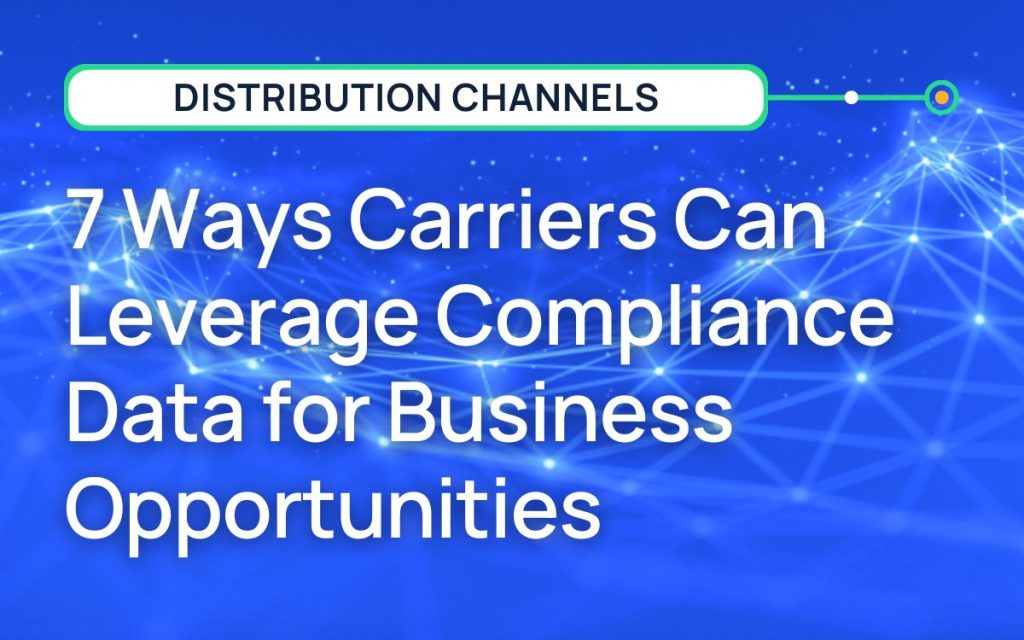7 Ways Carriers Can Leverage Compliance Data for Business Opportunities
Historically, carriers have been inclined to treat compliance as a series of necessary checklist items to perform. But by shifting your mindset to see compliance as a function of superior business data with automations integrated throughout your entire system of operations, you can realize numerous benefits.

Here, we’ve listed some common use cases for how carriers can leverage compliance data for leaner, more agile, less risky, more profitable businesses. There may be only seven here, but there’s no end to the ways you can leverage this data once you’ve decided to shift your mindset from seeing compliance as a list of steps in a process and instead see it as an opportunity to mine your data for use in business decisions.
No.1 Stop compliance violations before they happen
Perhaps most obviously, baking NIPR-sourced data into your team’s point of decision making can de-risk your business and end the time-suck of accidentally greenlighting impossible situations. Commissions payments can greatly benefit from this automated data. Another fantastic use case: Carrier call centers that use license and appointment data to auto-route calls based on location only to a producer who is properly licensed and appointed to discuss products with a prospective customer.
No. 2 Compliance data as cost saving tools
If you’re tired of proactively appointing every producer who raises their hands, you can use compliance data to realize numerous cost-savings for your business, but one easy application is in appointment cost savings.
Operationalize Just-in-Time appointments
If you’re looking to leverage compliance data for cost savings, one clear choice is to operationalize your organization’s ability to use Just-in-Time appointments. These legal provisions allow carriers to hold off on reporting appointments – and paying for them – in most states until after the producer has written business.
Since the majority of appointment states require individual-level appointments, waiting to process appointments both on a producer-to-producer basis and on a state-by-state basis can save hundreds of thousands of dollars depending on the size of your distribution channels.
Eliminating appointment renewal fees for producers who aren’t producing
State appointment renewals may be annual, biennial, or on some other basis depending on what states you operate in. But getting the list of which producers you should terminate in what states before the deadline can be a race of manual hours of reporting. If you have accurate data woven up and down your systems, generating a report of who writes business and where should be a breeze, and could save thousands of dollars in renewal fees.
No. 3 Calculate a real ROI for your producers
When you work across states, you have a dilemma of not only whether to appoint a producer, but also whether to appoint them in every state you offer products in. By integrating your policy admin system data with license and appointment data, you can see the real cost of what you’re paying out for not only your agency partners, but also individual-level producers and what they deliver in return on a per-state basis.
For example, someone who’s a major player in Kansas may be a waste of an appointment fee in Nebraska. Or you may have appointed 60 producers from an agency only to discover that more than half of them aren’t writing your business. This individual-level data is critical in understanding whether you have a valuable agency partner, or just one or two very valuable producers. It can also make it far easier to negotiate contracts at renewal time when you can arm your recruiting teams with concrete data about what each producer and agency contributes to your business.
No. 4 Leveraging compliance data as competitive data
If you’re drawing data from the industry source of truth, then you can set your system up to exclusively look at the strictest of data slices that pertain to just compliance. Or you can extend your data collection to include the kind of information that gives you key intel. E.g.:
- Individual-level licensing data can tell you where your producers are licensed that they aren’t selling for you
- Producer lines of authority can give you insight into what other products your producers sell
- Broader appointment data tells you which other carriers your producers work with for key competitive data
This kind of data can help you make key business decisions about mergers, acquisitions, product expansions, competitive moves, and regional sales without guessing at your capacity or relying on gut feelings.
No. 5 De-risking your sales force
It’s not a secret that the industry is facing a shift as the current crop of producers takes on ever-growing books of business as their slightly older compatriots retire and age out of the business. But even today’s super-producers will retire.
Now, we’re long-standing proponents of the idea that cutting out paperwork and manual processes is key to recruiting younger producers, and industry research shows younger producers are very comfortable with self-service options and generally hate repetitive copy-paste work. You also can’t abandon your current super-producers whose definition of white-glove service is likely to include high-touch human interaction.
But often insurance carriers don’t even understand the real makeup of their sales force. Taking an atomic look at producer data and seeing who your super-sellers are and estimating the percent who are within hitting distance of retirement can help you figure out how to prioritize your strategies for recruiting and retaining producers.
No. 6 Shoring up institutional knowledge
Internally, you may face similar risks to the threat of a retiring producer workforce. If you’re like many carriers, you have a single or maybe two compliance or operations managers who know what they’re doing, and they’re constantly training and retraining a green crew. You may face the risk of losing all that knowledge when they retire or leave.
If you can support more institutional knowledge as data points inside of your business systems and tools, then you can shorten the training period it takes to onboard new employees.
No. 7 Quick pivots in shifting economic or regulatory conditions
Unprecedented regional fires. Regulators with something to prove. Market downturns. These are all situations that demand organizational-level pivots and product innovations and make every ounce of dead weight on your proverbial ship a threat to your solvency and profitability. If every change requires a manual overhaul, you’re in trouble.
Having easy access to data about product lines, appointments, individual licenses, and competitive intel can help you be more resilient to market and regulatory shifts.
AgentSync is transforming compliance through better data
Geico very publicly is trying to shrink its 600-plus tech systems into something closer to 20 by leveraging cross-system integrations for better data. And they are far from the only ones. Because AgentSync is built on a cloud-native infrastructure and uses APIs to transmit data across systems, we’re able to plug into other core business systems and surface the data you need at the point of decision-making. But don’t take our word for it – read from our customers themselves about how they use AgentSync’s solutions to grow their businesses more efficiently.
About AgentSync
AgentSync builds modern insurance infrastructure that connects carriers, agencies, MGAs, and producers. With customer-centric design, seamless APIs, automation, and unparalleled service, AgentSync’s solutions provide data intelligence and streamlined onboarding and compliance management processes that reduce costs, increase efficiency, and get producers ready to sell in hours instead of weeks. Founded in 2018 by Niranjan “Niji” Sabharwal and Jenn Knight, and headquartered in Denver, CO, AgentSync has been recognized as one of Denver’s Best Places to Work, a Forbes Magazine Cloud 100 Rising Star, and as an Insurtech Insights Future 50 winner, and was ranked 65 in Forbes – America’s Best Startup Employers 2023. To learn more, visit https://agentsync.io

